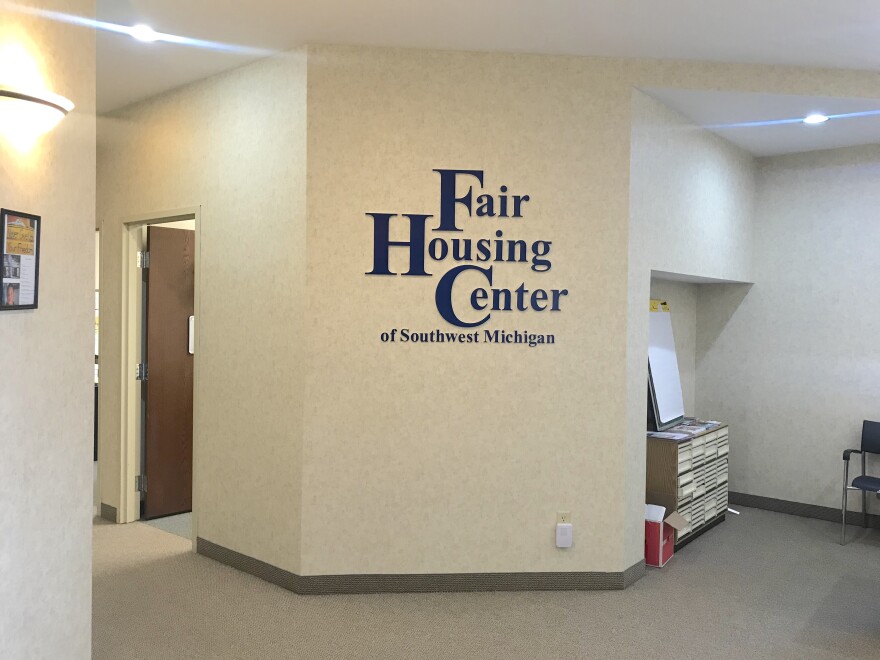For 13 years, Pat Maye's job at the Fair Housing Center of Southwest Michigan was to educate the public, including Realtors and landlords, about federal housing discrimination laws. The issue was deeply personal: She says she, herself, had been discriminated against in the city of Kalamazoo.

It happened when her husband was serving in the Vietnam War in 1967. Maye says she continued to live in their apartment until one day her landlord learned that the 20-year-old wife was pregnant.
While Maye says she's seen a reduction in housing discrimination in large metropolitan areas, violations continue and there's not enough fair housing centers to investigate complaints
"My landlord kicked me out," Maye says in an interview on today's WestSouthwest, WMUK's news and public affairs show, as she reflected on why the Fair Housing Act was needed and continues to be. It was enacted in 1968.
In April, the act turned 50 years old. Thanks to the act, there are legal protections today for African-Americans like Maye, and for individuals with families.
But in '67, Maye was on her own.
She recalls that other landlords similarly refused to rent an apartment to her because she was pregnant and, then after her son was born, because she was a mother with a baby.
"Finally, I found a landlord that would rent to me but he said, 'You have to have a two-bedroom because you have a son. A mother and a son can't share a bedroom.' "
As she was living alone on a limited income at the time, she says she could not afford a two-bedroom unit, so she moved in with her brother.
The Fair Housing Act was passed in April 1968, a few days after the assassination of Martin Luther King, who had pushed for the legislation.
The act banned housing discrimination based on race, religion and national origin in apartment rentals, home sales and mortgage lending.
It was amended in 1988 to also protect families with children, as well as persons with disabilities, according to Maye.

The 50-year anniversary of the Fair Housing Act was the theme of a conference that the Fair Housing Center of Southwest Michigan held last Friday.
Maye, now 70, spoke at the workshop titled "Our Stories, Our Past." She had moved to Kalamazoo in 1965 from Alabama.
While Kalamazoo County is not alone in this, data from 2005-2009 shows housing discrimination persists locally, according to Maye
Does she feel the Fair Housing Act has been successful?
Maye has mixed feelings.
She is a board member at the Fair Housing Center of Southwest Michigan, where she was once director of education and outreach for many years. She retired in 2015.
While Maye has seen a reduction in housing discrimination in large metropolitan areas, she says on WestSouthwest, violations continue and there's not nearly enough fair housing centers to investigate complaints.
And she remains troubled that some landlords still engage in "steering." She says that is the illegal practice of failing to disclose to prospective tenants all the available units and, instead, grouping those individuals into a certain section of the complex.
Then loopholes are being used to avoid renting to people that one doesn't want to, Maye says. For example, one loophole is that landlords of owner-occupied apartments of four or fewer units do not have to rent to families with children, she says.
She adds that some landlords are even unlawfully charging higher rents and security deposits to people of color and families with children, in hopes of keeping them away.
Maye says the Fair Housing Center of Southwest Michigan periodically checks for bias by sending black and white "testers" into the community.
While Kalamazoo County is not alone in this, the center's data from 2005-2009 shows housing discrimination persists locally, according to Maye. Specifically:
- Real estate sales tests showed disparity in treatment based on race in Kalamazoo County in 12 of the 21 tests, or 57 percent.
- Rental tests showed disparity in treatment based on race in Kalamazoo County in 28 of the 81 tests, or 35 percent.
In Michigan, there are about five fair housing centers, Maye says.
They are mainly funded by the U.S. Department of Housing and Urban Development, which oversees compliance of the Fair Housing Act. She says fines can be imposed for infractions.





